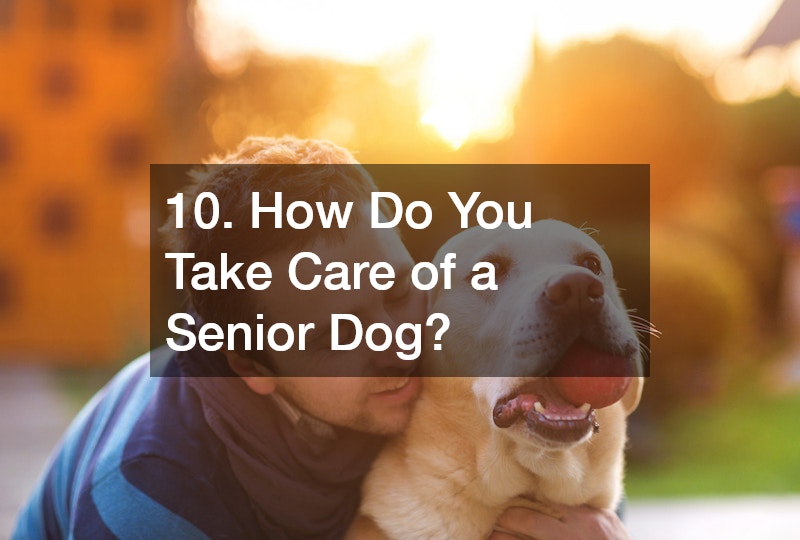Taking care of your dog is one of the most fulfilling responsibilities a pet parent can undertake. Dogs are not just animals; they are companions that require love, attention, and proper care. Understanding the various aspects of their well-being is crucial if you want your canine friend to live a long and happy life. Whether you’re a first-time pet owner or a seasoned guardian, staying informed is paramount. This guide will offer insights into the key areas you need to focus on to ensure you’re offering your dog the best care possible.
1. How Often Should You Bathe Your Dog?

Bathing your dog is essential, but frequency depends largely on factors such as their coat type, lifestyle, and specific needs. Dogs with oily coats, like Basset Hounds, may require weekly baths, while other breeds could need bathing less frequently. Excessive bathing can lead to dry, irritated skin, so it’s vital to consult local veterinarians or local emergency vets for guidance tailored to your furry friend.
It’s also important to use dog-specific shampoos that are gentle on their skin and effective at cleaning their coat. You might be tempted to use human shampoos, but these can disrupt a dog’s natural skin barrier. For emergency grooming issues, animal urgent care facilities may provide the necessary support or referrals.
Regular grooming sessions between baths help remove dirt and debris, keeping your dog’s coat clean and healthy. Proper grooming encourages a strong bond between you and your pet while giving you a chance to check for any unusual lumps or skin conditions. In case of abnormalities, local vet clinics can provide the necessary medical advice and treatment.
2. What Should You Feed Your Dog?
Feeding your dog the right diet is crucial in maintaining their health and vitality. A balanced diet typically includes proteins, carbohydrates, fats, vitamins, and minerals suitable for your dog’s breed, age, and activity level. Consulting with local veterinarians can help you determine the specific nutritional needs of your canine companion.
While commercial dog foods are formulated to provide balanced nutrition, the plethora of options can be overwhelming. Grain-free, raw diets, and home-cooked meals are popular choices, but it’s essential to ensure they meet all nutritional requirements. Seeking advice from animal urgent care professionals can offer additional guidance, especially for dogs with specific dietary needs.
Always provide fresh water daily alongside meals, as hydration is a key element in caring for your dog’s overall health. For dogs with food allergies or intolerances, a specialized diet may be necessary, and consulting with a nutrition-focused local vet clinic can help tailor a suitable meal plan. Remember, proper nutrition is foundational in how you take care of your dog.
3. How Much Exercise Does Your Dog Need?
Exercise plays a vital role in keeping your dog healthy and happy, helping to maintain an ideal weight, and preventing behavioral issues. The amount of exercise required varies by breed, age, and general health. Active breeds such as Border Collies require more exercise than small, lower-energy dogs like Bulldogs.
It’s crucial to create a consistent exercise routine that includes daily walks, playtime, and mental stimulation activities. Engage your dog in activities like fetch, agility training, or swimming to challenge both their body and mind. Regular visits to local parks or doggy daycares can also provide opportunities for socialization and play.
Be mindful of over-exercising, especially in extreme weather conditions or for senior dogs with mobility challenges. Local veterinarians can help determine the most suitable exercise regimen and discuss appropriate activities tailored for your dog’s needs. Taking care of your dog includes ensuring they get adequate exercise for their well-being.
4. How Do You Train Your Dog?

Training your dog is an essential part of fostering a well-behaved and balanced pet. Effective training offers mental stimulation and enhances the bond between you and your dog, contributing significantly to their happiness. Start training your dog as soon as possible, using positive reinforcement techniques that encourage good behavior.
Socialization is equally important, helping your dog adjust to various environments, people, and other animals. Consider enrolling in puppy training classes offered by local dog trainers to provide a structured learning opportunity. Consistency and patience are key in training; remain committed to regular sessions and celebrate your dog’s progress.
For dogs that exhibit behavioral challenges, consulting with professionals at local vet clinics can provide insights and suggest specialized training programs. Establishing clear communication through training helps you take care of your dog’s behavioral needs, ensuring they’re well-adjusted members of your family. Remember, training is an ongoing process rather than a one-time event.
5. How Can You Help Your Dog Overcome Anxiety?
Anxiety is a common issue among dogs that can manifest in various ways, such as excessive barking, destructive behavior, or fearfulness. Understanding the root cause of your dog’s anxiety is the first step in addressing it effectively. Consulting with local veterinarians can provide valuable insights into identifying triggers and developing a management plan.
Various strategies can help alleviate anxiety, including providing a safe and calming environment, regular exercise, and mental stimulation. Consider using anxiety-reducing tools like calming collars or anxiety wraps. In some cases, the involvement of a local dog trainer may also be beneficial to implement behavior modification techniques.
For dogs with severe anxiety that doesn’t respond to behavioral interventions, medication prescribed by a veterinarian might be necessary. In such cases, discussing options during your visits to the local vet clinic can offer clarity and relief. Helping your dog overcome anxiety is crucial in taking care of your dog’s mental and emotional well-being.
6. How Do You Choose the Right Veterinarian?
Selecting the right veterinarian is a cornerstone of effectively taking care of your dog’s health. When considering local vet clinics, prioritize those with a reputation for excellent animal care and knowledgeable staff. Recommendations from friends or family who own pets can be a valuable starting point.
It’s essential to choose a veterinarian who makes you feel comfortable and confident in their abilities. During initial visits, ask about their approach to animal healthcare, available services, and emergency protocols. For unforeseen situations, local emergency vets can offer critical care, but knowing your regular vet’s capabilities is vital.
Building a lasting relationship with your veterinarian includes regular check-ups, vaccinations, and addressing any health issues your dog may face. Many clinics also provide services like dental care, diet consultations, and more, adding value to your dog’s healthcare regime. Taking care of your dog’s health starts with selecting a veterinarian you trust and can rely on. Additionally, when it unfortunately comes time to put your pet down, having a trusted vet to perform pet euthanasia can add comfort to a harrowing time.
7. How Can You Maintain Your Dog’s Dental Health?

Dental health is a fundamental aspect of your dog’s overall well-being. Ignoring dental care can lead to serious issues like gum disease and tooth loss, impacting your dog’s quality of life. Regular brushing of your dog’s teeth helps prevent plaque and tartar buildup.
Incorporate dental chews or toys designed to clean teeth as part of your dog’s oral care regimen. Various products are available in the market, so consult local veterinarians to choose the most suitable options. Regular dental check-ups at a local vet clinic can help identify issues early and keep your dog’s mouth healthy.
Periodontal disease can lead to other health complications if left untreated, emphasizing the need for vigilance in dental care. Early interventions ensure prolonged dental health, contributing to your dog’s overall care. Consistent dental routines are important in taking care of your dog, ensuring they enjoy life to the fullest.
8. How Do You Ensure Your Dog is Safe?
Ensuring your dog’s safety is paramount in their caregiving, requiring vigilance in various environments and everyday routines. Start by providing a secure and comfortable living space, free of hazards such as exposed wires, small objects that can be swallowed, or toxic cleaning supplies. Creating designated areas for rest and play helps your dog feel both protected and relaxed. Take care of your dog by always supervising interactions, especially with unfamiliar animals or people, since not all encounters are predictable. Early supervision helps prevent behavioral issues and builds trust between you and your pet.
Invest in reliable dog gear such as durable collars, leashes, and ID tags for outings. These are simple yet crucial safeguards in preventing your dog from wandering or getting lost. Microchipping is also recommended as an additional measure, allowing veterinarians or shelters to identify and return lost pets more easily. When you’re away, consider reputable doggy daycares or a pet boarding company that maintain high safety standards and provide constant supervision, exercise, and enrichment.
Equally important is awareness of potential environmental dangers like toxic plants, harmful foods, and hazardous household items such as chocolate, xylitol, or antifreeze. Regular consultations with local veterinarians will keep you informed about the latest safety practices, seasonal risks, and vaccination updates. By taking preventive measures, you ensure your dog’s experiences in the world remain positive, healthy, and secure—allowing them to thrive under your attentive care.
9. How Do You Socialize Your Dog?
Socialization is vital for your dog to adjust to different environments, people, and animals. Begin socializing your puppy as early as possible with a variety of experiences that build their confidence. Puppy training classes guided by local dog trainers can be a structured approach to initiate socialization. These classes not only teach basic commands but also allow your dog to interact with other puppies in a controlled, supervised environment, helping them learn appropriate behavior from an early age.
Expose your dog to everyday sights, sounds, and different settings like parks, sidewalks, boarding services, or pet-friendly stores to help them become well-adjusted. Introducing them to various textures such as grass, pavement, and sand also helps reduce fear in new situations. Controlled interactions with other dogs in safe settings nurture positive social behavior. Doggy daycares can provide regular opportunities for socialization, integrating play with other dogs under the supervision of trained staff who understand canine behavior and communication cues.
For dogs that show aggression or fear during social interactions, it’s important to consult with behavior specialists or certified dog trainers. Implementing positive reinforcement strategies—such as rewarding calm, confident behavior—can help in overcoming social anxieties. Be patient and consistent; forcing interactions can worsen fear or aggression. Successful socialization is crucial to take care of your dog’s emotional health and overall adaptability in their surroundings. A well-socialized dog is generally happier, less stressed, and more capable of handling new experiences with ease, strengthening the bond between you and your pet.
10. How Do You Take Care of a Senior Dog?

As your dog moves into their senior years, their needs will change and require special attention. Regular vet check-ups become increasingly important to monitor age-related health issues like arthritis or heart disease. A well-rounded diet, tailored to maintaining a healthy weight and providing joint support, is essential for a senior dog.
Mobility may decline with age, so adapting their environment to make navigation easier is crucial. Ramps, orthopedic beds, and easy-access feeding areas can significantly improve their comfort. Consult with local veterinarians about adding supplements to support joint health as part of your routine in taking care of your dog.
Mental stimulation remains important, so engage your senior dog with low-impact games and gentle walks. Pay attention to any changes in behavior or temperament, as these can indicate underlying health issues requiring veterinary consultation. Caring for a senior dog encompasses an understanding and patience essential in taking care of your dog’s lifelong needs.
Taking care of your dog requires commitment, knowledge, and compassion for their ever-evolving needs. From understanding the essentials of nutrition and exercise to prioritizing mental health and safety, pet parents must be prepared to adapt and learn. Consulting with local veterinarians and professionals ensures you’re informed on the best practices for every aspect of your dog’s care.
Embrace the responsibility with joy as you continue to develop a loving and fulfilling relationship with your dog. By following these guidelines, your dedication ensures a happy, healthy, and contented life for your furry friend. Investing time and effort in taking care of your dog pays off in the cherished companionship and unwavering loyalty only a dog can offer.







